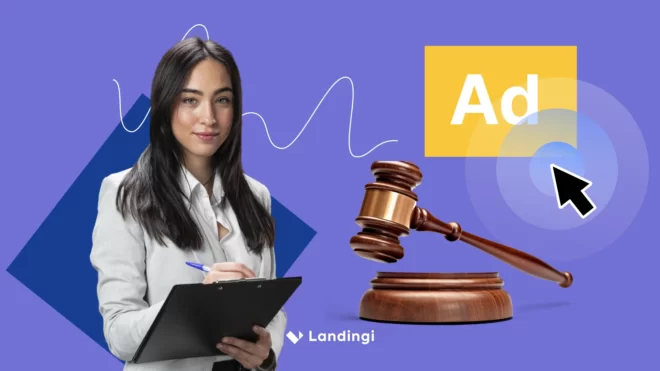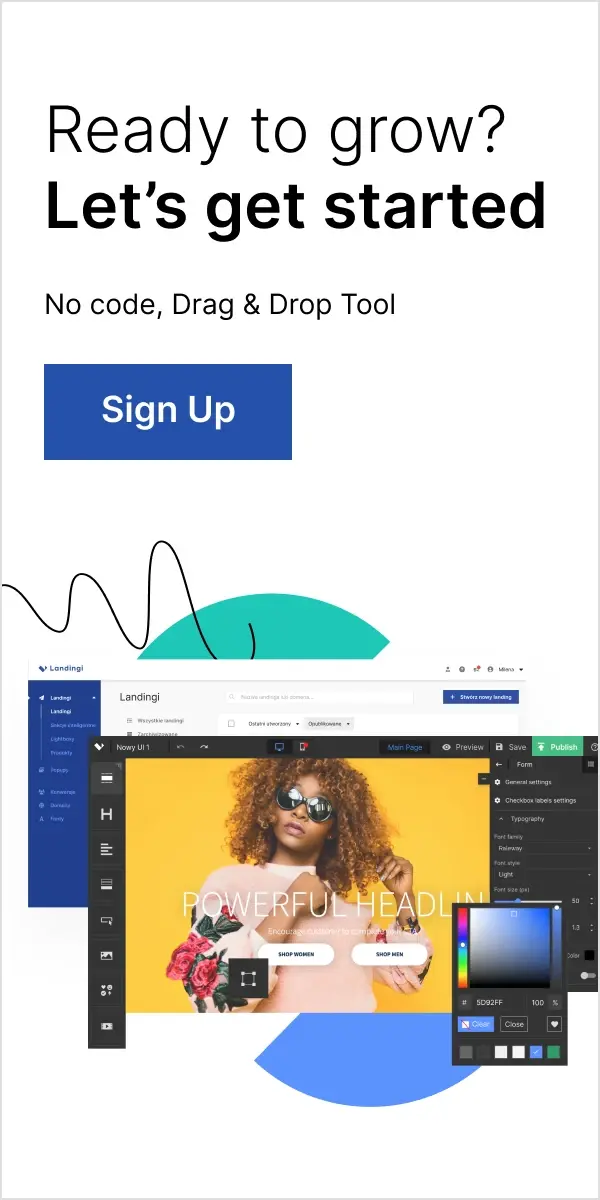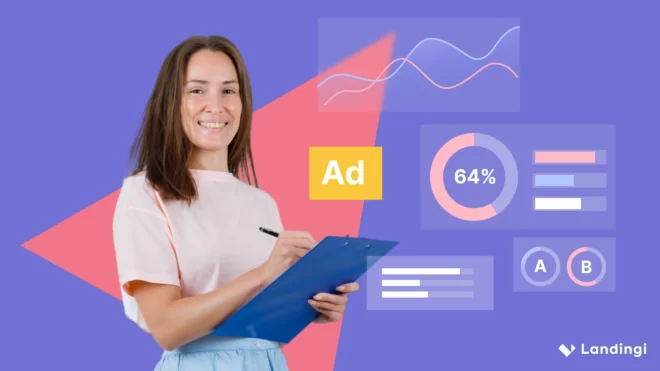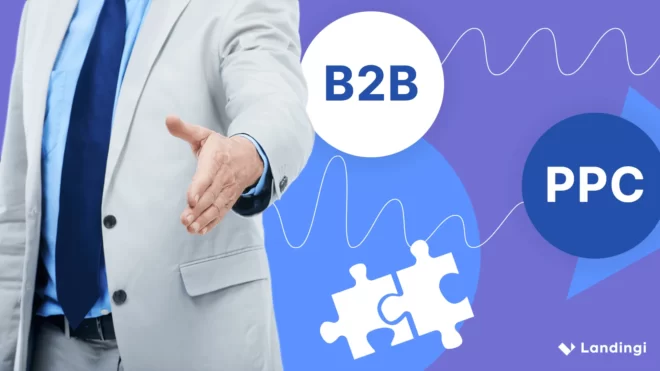Pay-per-click (PPC) advertising helps law firms attract new clients by showing ads to people searching for legal services online. PPC campaigns ensure that your ads reach the right audience at the right time. A good PPC landing page is key to turning these clicks into leads and clients by providing clear and relevant information.
In this article, we’ll look at the best strategies, tools, and tips for successful PPC campaigns in the legal field. We’ll also explain why Landingi is considered the best builder for creating effective PPC landing pages for law firms.
Key Takeaways:
- Conducting thorough keyword research ensures PPC ads reach the right audience, and using negative keywords helps filter out irrelevant traffic.
- Clear and compelling ad copy with strong calls to action, along with optimized, mobile-friendly landing pages, improves conversion rates.
- Effective PPC campaign management involves using tools like Google Ads, SEMrush, Ahrefs, Moz, SpyFu, Landingi, and Google Analytics.
- Regular optimization of PPC campaigns by tracking metrics such as click-through rates, conversion rates, and cost per conversion helps maximize ROI.
- Staying updated with PPC trends, including the use of AI, video ads, mobile optimization, personalization, voice search, and data privacy compliance, is crucial.
- Avoiding common mistakes like neglecting keyword research, using irrelevant ad copy, failing to optimize landing pages, and not tracking conversions is essential for effective PPC campaigns.
Make your sections smartable and let go of mundane manual tasks with Smart Sections! An easy way to manage bulk changes.
What is PPC Advertising in Law?
Pay-per-click (PPC) advertising in law is a type of online advertising where law firms pay a fee each time someone clicks on their ad. These ads appear on search engines like Google when people search for legal services. PPC ads help law firms reach potential clients who are actively looking for legal help.
If you wonder how PPC in law works in practice, here is the example action sequence:
1. Law company “Tresp Law” uses Google Ads and pays to display their advertisement in search engine results (SERPs) every time someone searches in Google for “the best law firm in San Diego”.
2. A potential client types in the Google search field “the best law firm in San Diego’. What does he see in the search results? Probably a kind of this:
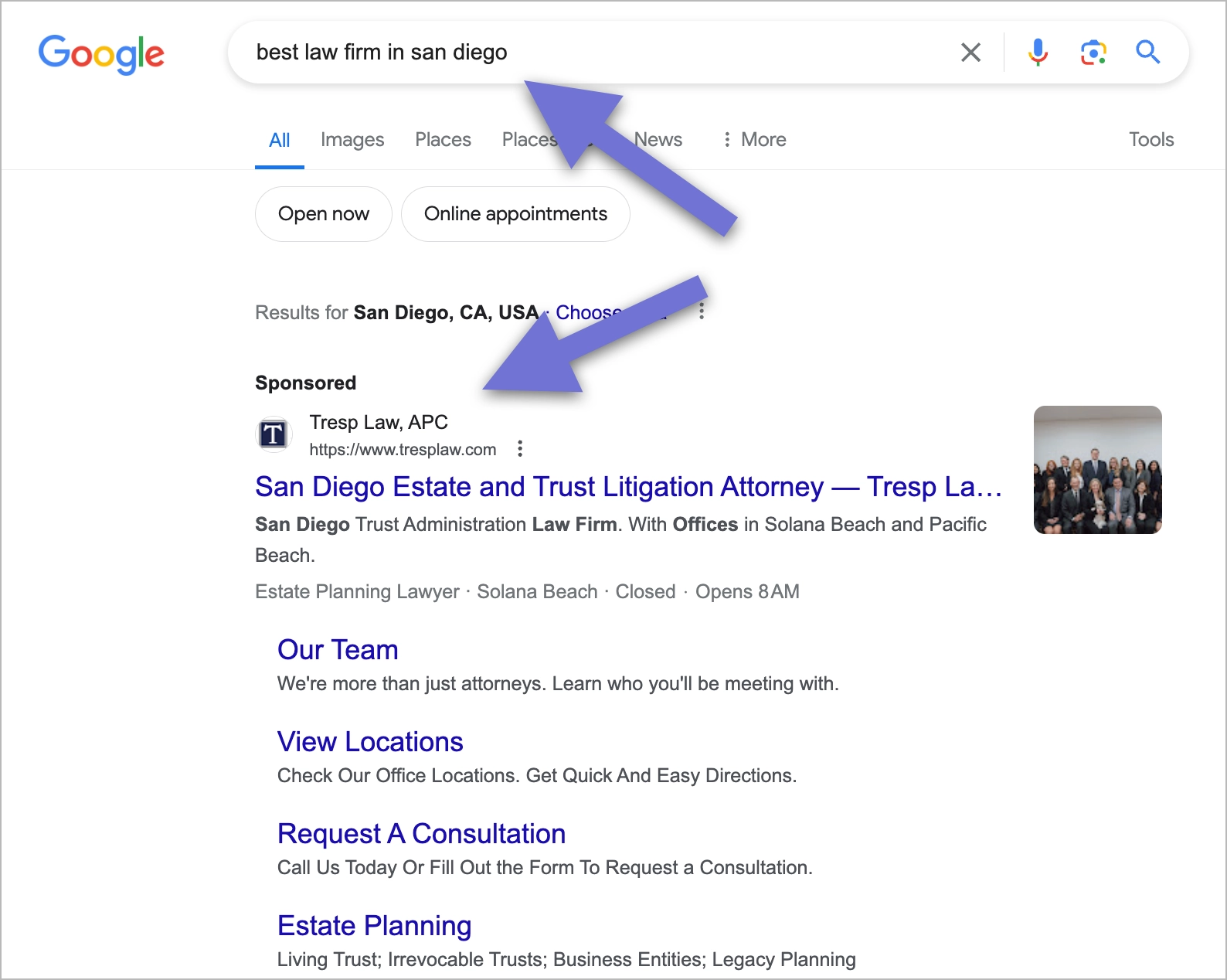
3. If the client clicks the link and visits the “Tresp Law” landing page, Google charges the company for driving this successful action. In exchange, however, the company acquires a new lead. He can then be persuaded to become a client.
Not that complicated, right?
Who Should Use PPC in Law?
PPC in law should be used by legal professionals looking to attract more clients online. This includes:
- Solo Practitioners: Individual lawyers who want to gain more clients without high advertising costs. PPC allows them to target specific keywords related to their practice areas, ensuring their ads are seen by potential clients actively searching for legal services.
- Small Law Firms: Firms that need to compete with larger firms by getting their services noticed quickly. PPC campaigns can help small firms increase their visibility and reach a larger audience, leveling the playing field against bigger competitors.
- Large Law Firms: Big firms aiming to dominate search results and reach a broader audience. PPC advertising helps these firms maintain a strong online presence, ensuring their ads appear at the top of search results for relevant keywords.
- Specialized Legal Services: Lawyers focusing on specific areas, like personal injury, family law, or criminal defense, who want to target people searching for those services. PPC campaigns can be tailored to highlight these specializations, attracting clients who need specific legal expertise.
PPC is suitable for any law firm aiming to increase its online presence, attract more clients effectively, and gain a competitive edge in the digital landscape.
What are the Benefits of Using PPC Advertising for Law?
The benefits of using PPC advertising for law include:
- Immediate Results: PPC ads can start driving traffic to your website as soon as they are activated, providing quick visibility and immediate results.
- Targeted Audience: PPC allows you to target specific keywords, demographics, locations, and even the time of day your ads are shown, ensuring your ads reach the right audience.
- Cost Control: You have full control over your budget with PPC. You can set daily or monthly limits and adjust your spending based on performance.
- Measurable ROI: PPC campaigns provide detailed analytics, making it easy to measure the return on investment (ROI) and see which ads are most effective.
- Flexibility: PPC campaigns can be quickly adjusted or paused based on performance, allowing for flexible and responsive advertising strategies.
- Enhanced Brand Awareness: Even if users don’t click on your ads, they still see your firm’s name, increasing brand recognition and awareness.
- Competitive Edge: PPC can help you stand out in a crowded market, allowing smaller firms to compete with larger ones by securing top positions in search results.
Using PPC advertising can significantly enhance your law firm’s online presence, attract more potential clients, and provide measurable, cost-effective results.
Key Strategies for Successful Law PPC Campaigns
To run a successful PPC campaign for your law firm, you should focus on the following key strategies:
- Keyword Research: PPC in law should start with thorough keyword research. Identify relevant keywords that potential clients are using to search for legal services. Use tools like Google Keyword Planner, SEMrush, or Ahrefs to find high-volume and low-competition keywords. Consider both short-tail and long-tail keywords to capture a wide range of search queries.
- Compelling Ad Copy: Write clear and compelling ad copy that highlights your firm’s unique selling points. Include a strong call to action (CTA) that encourages users to click on your ad. Your ad copy should address the needs and concerns of your target audience. Use action-oriented language and incorporate relevant keywords to improve ad relevance and quality score.
- Landing Page Optimization: Ensure your landing pages are optimized for conversions. This includes having a clear headline, concise content, and an easy-to-use contact form. Make sure the landing page is relevant to the ad to improve quality scores. Use testimonials, trust signals (like badges or certifications), and clear CTAs to build trust and encourage visitors to take action. The landing page should load quickly and be mobile-friendly.
- Targeting Options: Use advanced targeting options to reach your ideal audience. This can include geographic targeting to focus on specific regions or cities, demographic targeting to reach certain age groups or income levels, and device targeting to optimize ads for mobile or desktop users. Tailor your ads to specific segments for better results. You can also use remarketing to target users who have previously visited your site.
- Ad Extensions: Utilize ad extensions to provide additional information and increase the visibility of your ads. Extensions can include site links (links to specific pages on your site), call buttons (for mobile users to call directly), location information (address and map), and more. Ad extensions can improve click-through rates (CTR) and provide users with more reasons to click on your ad.
- A/B Testing: Continuously test different ad variations to see what works best. Experiment with different headlines, descriptions, and CTAs to optimize your ads over time. Run A/B tests on your landing pages as well to determine which designs and messages drive the most conversions. Analyze the results and implement the changes that lead to better performance.
- Bid Management: Monitor and adjust your bids to ensure you are getting the best return on investment. Use automated bidding strategies offered by platforms like Google Ads to optimize your bids based on your goals, such as maximizing clicks, conversions, or return on ad spend (ROAS). Adjust your bids based on the performance of keywords, time of day, and geographic locations.
- Conversion Tracking: Implement conversion tracking to measure the effectiveness of your paid marketing campaigns. Track actions like form submissions, phone calls, and downloads to understand which ads are driving the most conversions. Use tools like Google Analytics to set up and track these conversions. This data will help you identify which campaigns, ad groups, and keywords are most successful.
- Regular Monitoring and Optimization: Regularly review your campaign performance and make necessary adjustments. Look for trends and insights in the data to optimize your campaigns for better results. Monitor key metrics such as CTR, conversion rate, cost per click (CPC), and cost per acquisition (CPA). Make data-driven decisions to pause underperforming ads, adjust bids, and refine your targeting.
By following these strategies, you can maximize the effectiveness of your PPC campaigns, attract more clients to your law firm, and achieve a higher return on your advertising investment.
How to Choose Effective Keywords for Law PPC Campaigns
Choosing effective keywords for your law PPC campaigns involves several important steps, from understanding your audience through implementing professional tools to continuous monitoring and optimizing a set you bid on.
First, knowledge about your audience is crucial. Think about what potential clients might search for when they need legal services. Consider the terms and phrases they are likely to use, including specific legal services, common legal issues, and geographic locations.
Using keyword research tools like Google Keyword Planner, SEMrush, and Ahrefs can greatly assist in finding relevant keywords. These tools provide data on search volume, competition, and keyword suggestions, helping you identify keywords with a good balance of high search volume and low competition.
Focusing on long-tail keywords is another key strategy. These are longer and more specific phrases that potential clients might use, such as “affordable divorce lawyer in New York” instead of just “divorce lawyer.” Long-tail keywords often have less competition and attract more qualified leads.
Considering user intent is also essential. Choose keywords that match the searcher’s intent. Keywords like “hire a personal injury lawyer” indicate a strong intent to take action, while “what does a personal injury lawyer do” suggests they are still in the research phase.
Analyzing competitors can provide valuable insights. Look at the keywords your competitors are using to drive traffic to their websites. Tools like SpyFu can help you understand the competitive landscape and identify potential keywords you might have missed.
Using negative keywords is important to avoid irrelevant searches. For example, a criminal defense lawyer might exclude keywords related to “free legal advice” to avoid attracting non-paying clients. Regularly reviewing and updating your negative keyword list can improve ad relevance and performance.
Organizing your keywords into tightly themed ad groups is another effective strategy. This ensures your ads are highly relevant to the keywords being searched, which can improve your quality score and ad performance. For example, create separate ad groups for “personal injury lawyer,” “divorce lawyer,” and “criminal defense lawyer.”
Finally, continuously monitor the performance of your keywords. Use metrics like click-through rate (CTR), conversion rate, and cost per click (CPC) to identify which keywords are performing well and which are not. Adjust your keyword strategy based on this data to optimize your campaigns.
Choosing the Best Ad Formats for Law PPC
The choice of ad format for your law PPC campaign depends on your specific goals, target audience, and the nature of the legal services you offer. Different ad formats serve different purposes and can engage your audience in various ways. Below, we’ll explore the pros and cons of several effective ad formats.
Search Ads
These are the most common PPC ads that appear at the top of search engine results pages (SERPs). Search ads are text-based and highly effective for targeting users actively searching for legal services. They typically include a headline, description, and a URL. For law firms, search ads can drive high-intent traffic and generate leads.
Pros:
- High Intent Traffic: Targets users actively searching for legal services.
- Cost-Effective: Pay only when someone clicks on your ad.
- Customizable: Allows for precise keyword targeting and ad copy customization.
Cons:
- Competitive: High competition for popular keywords can drive up costs.
- Limited Space: Only a small amount of text to convey your message.
- Ad Blindness: Users may skip over ads, focusing on organic results instead.
Display Ads
Display ads appear on various websites across the internet and can include images, banners, or videos. These ads are useful for raising brand awareness and reaching a broader audience. Display ads can be particularly effective for retargeting users who have previously visited your website.
Pros:
- Wide Reach: Appears on various websites, reaching a broader audience.
- Visual Appeal: Can include images or videos, making ads more engaging.
- Remarketing Capabilities: Effective for retargeting visitors who did not convert.
Cons:
- Lower Intent: Users may not be actively looking for legal services when they see your ad.
- Banner Blindness: Many users ignore banner ads.
- Potentially Lower Click-Through Rate: Display ads often have lower CTR compared to search.
Video Ads
Video ads are engaging and can be used to explain complex legal concepts or showcase client testimonials. These ads can appear on platforms like YouTube or as part of display ad campaigns. Video ads can help build trust and credibility with potential clients.
Pros:
- Engaging: Captures attention with motion and sound.
- Storytelling: Great for explaining complex legal concepts or showcasing client testimonials.
- Versatile: Can be used on platforms like YouTube and across display networks.
Cons:
- Production Costs: Creating high-quality video content can be expensive.
- Attention Span: Requires capturing the viewer’s attention quickly to be effective.
- Ad Skipping: Users may skip ads, especially on platforms like YouTube.
Gmail Ads
Gmail Ads are interactive ads that appear in the Promotions and Social tabs of a user’s Gmail inbox. These ads resemble regular emails and expand when clicked, allowing you to include images, videos, and forms. Gmail Ads can be a valuable addition to your PPC strategy, particularly for reaching potential clients who frequently use Gmail.
Advantages:
- High Engagement: Gmail Ads often look like regular emails, which can increase open rates and user engagement.
- Rich Media Options: You can include images, videos, and forms, making your ads more interactive and appealing.
- Targeting Options: Allows for detailed targeting based on keywords, demographics, and user behavior, ensuring your ads reach a relevant audience.
Disadvantages:
- Limited Reach: Only targets users who use Gmail, potentially missing out on a broader audience.
- Ad Placement: Appears in the Promotions or Social tabs, which some users may ignore or rarely check.
- Complex Setup: Requires more effort to design and set up compared to traditional text or display ads.
When you choose the right type from the list above, consider using at least one of the following ad forms:
Local Service Ads (LSAs) are designed for service-based businesses, including law firms. These ads appear at the top of Google search results and include a business’s contact information, hours of operation, and customer reviews. LSAs can help local law firms connect with potential clients in their area.
Call-Only Ads are designed to encourage users to call your law firm directly from the ad. These ads are especially effective for mobile users. Call-only ads include your phone number and a call button, making it easy for potential clients to contact you immediately.
Responsive Search Ads allow you to provide multiple headlines and descriptions, which Google then tests to determine the most effective combinations. This ad format can improve your ad performance by automatically optimizing your ad copy based on user behavior.
Remarketing Ads target users who have previously visited your website but did not convert. These ads can remind potential clients of your services and encourage them to return to your site. Remarketing can be done through both display and search ads.
For your law PPC campaigns, it’s important to choose ad formats that match your unique goals and the audience you intend to target. Employing a combination of these ad formats can boost your ability to attract and engage potential clients successfully.
Get 111 Landing Page Examples—The Ultimate Guide for FREE
How to Manage PPC Campaigns in Law?
Effective management of PPC campaigns in the legal industry requires a strategic approach and regular oversight, including goal selection, crafting targeted content, and continuous optimization. Here’s how to manage your PPC campaigns for optimal results:
- Set Clear Goals: Start by defining clear objectives for your PPC campaigns. Whether it’s increasing website traffic, generating leads, or boosting conversions, having specific goals will guide your campaign strategy and help measure success.
- Organize Your Account: Structure your PPC account into relevant campaigns and ad groups. For law firms, this might mean separating campaigns by practice areas (e.g., personal injury, family law, criminal defense) and creating specific ad groups for different services within those areas.
- Optimize Content: Regularly update and optimize your ad copy to keep it relevant and engaging. Test different headlines, descriptions, and calls to action to see what resonates best with your audience. Use A/B testing to determine the most effective variations.
- Use Negative Keywords: Implement negative keywords to prevent your ads from showing for irrelevant searches. This helps to refine your targeting and ensures your budget is spent on clicks that are more likely to convert.
- Monitor Performance Metrics: Keep a close eye on key performance metrics such as click-through rate (CTR), conversion rate, cost per click (CPC), and return on ad spend (ROAS). These metrics will provide insights into how well your campaigns are performing and where adjustments are needed.
- Adjust Bids Strategically: Use bid adjustments to allocate more budget to high-performing keywords and less to underperforming ones. Consider factors like time of day, geographic location, and device type when making bid adjustments to maximize ROI.
- Leverage Automation: Utilize automation tools and features provided by platforms like Google Ads. Automated bidding, for instance, can help optimize your bids based on your campaign goals, while automated rules can streamline routine tasks.
- Regularly Review and Update: PPC campaigns are not set-and-forget. Regularly review your campaigns to identify areas for improvement. Update your keywords, ad copy, and targeting criteria based on performance data and market trends.
- Implement Tracking and Analytics: Set up conversion tracking to measure the success of your campaigns. Use tools like Google Analytics to track user behavior on your landing pages and identify opportunities for improvement.
- Stay Informed: Keep up-to-date with the latest trends and changes in PPC advertising. The digital marketing landscape is constantly evolving, and staying informed will help you adapt your strategies accordingly.
Managing PPC campaigns effectively involves continuous optimization and strategic adjustments. By following these steps, you can improve your campaign performance, attract more clients, and achieve a higher return on your advertising investment.
What are Best tools for PPC Law Campaigns?
The best tools for PPC advertising for a law firm include Google Ads, SEMrush, Landingi, Ahrefs, SpyFu and Google Analytics. Each tool offers unique features that cater to different aspects of running successful PPC campaigns, from keyword research and competitive analysis to conversion tracking and optimization. It’s important for law firms to understand how to leverage these tools effectively to maximize their advertising spend and attract more potential clients.
Google Ads
Google Ads is the primary platform for managing PPC campaigns. It absorbed Google AdWords, which became part of it. It offers robust features for keyword research, ad creation, bidding, and performance tracking.
For law firms, Google Ads can be used to conduct keyword research to identify high-intent keywords relevant to your legal services.
You can create compelling ads that highlight your firm’s unique value propositions, set up location targeting to focus on specific geographic areas, and use conversion tracking to measure the effectiveness of your ads, optimizing based on performance.
SEMrush
SEMrush is a comprehensive SEO and SEM tool that provides in-depth keyword research, competitive analysis, and PPC management capabilities.
Law firms can use SEMrush to analyze competitors, discovering which keywords they are targeting and their ad strategies. It also helps identify keyword opportunities, finding high-value keywords with low competition for your PPC campaigns, and track campaign performance to adjust strategies accordingly.
Landingi
Landingi is a leading landing page builder that allows you to create high-converting landing pages quickly. It’s very important for law firm PPC campaigns, as after clicking the ad, the user typically lands on the landing page. The design, responsiveness, and copy of your landing page play a significant role in a user’s decision to convert or not.
Law firms can use Landingi to design custom landing pages tailored for different legal services. In the platform, you can create landing pages based on over 300+ ready-to-use templates (including a lot for law services) or build them from scratch. Landingi also supports A/B testing, enabling you to test different landing page designs and content to determine what works best. Another great feature is EventTracker, providing data insights on how users interact with your pages. This kind of built-in analytics is pretty unique compared to other builders.
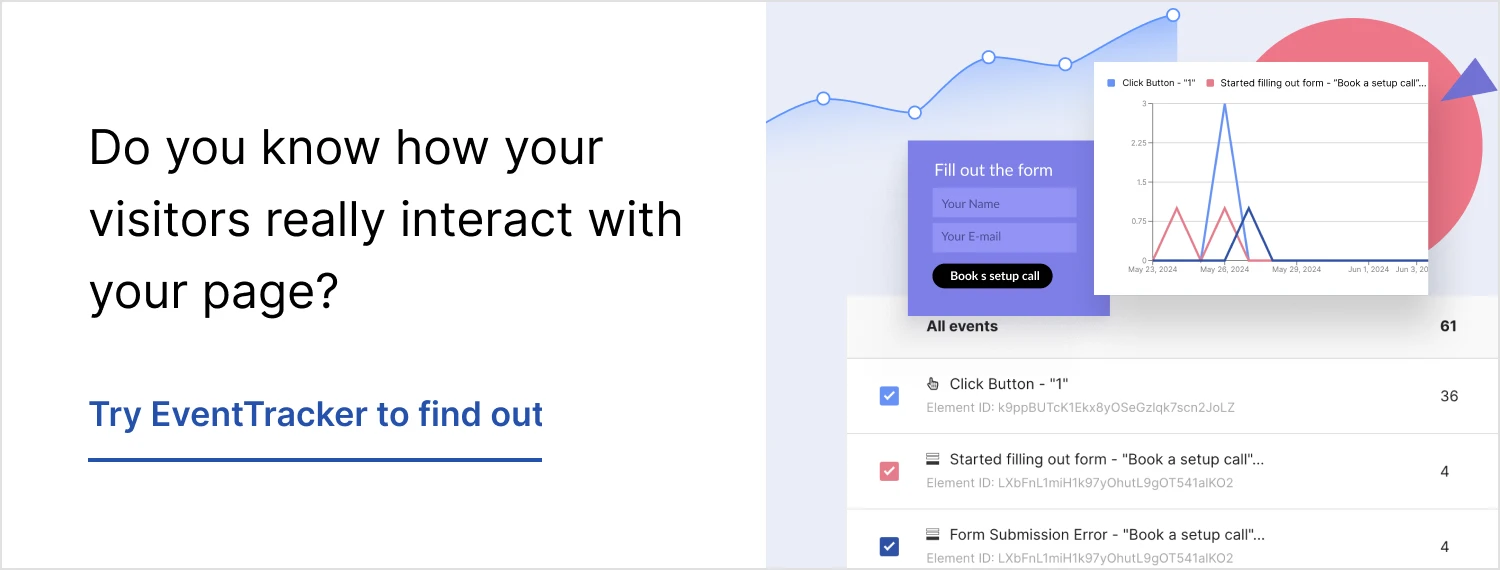
Of course, Landingi integrates seamlessly with PPC campaign apps and platforms, ensuring a smooth user experience and higher conversion rates.
Ahrefs
Ahrefs is known for its powerful backlink analysis and keyword research tools, which can also be used to monitor PPC campaigns.
Law firms can use Ahrefs to research keywords and identify relevant ones that potential clients might use. Its advantage over similar platforms is a volume of data and very often updates, which translates into very precise and up-to-date measures.
The tool also allows you to analyze competitor ads, gaining insights into their ad copy and keyword targeting. It should quickly give you the direction on how to adjust your ads to generate more clicks.
SpyFu
Law firms can use SpyFu to analyze competitor keywords and identify which ones they are targeting and their ad performance. This data helps develop effective ad strategies and monitor spending, understanding how much competitors are investing in their PPC campaigns to inform your budget decisions.
Google Analytics
Google Analytics is essential for tracking user behavior on your website and provides detailed insights into how visitors interact with your landing pages. Law firms can use it to track visitor behavior, understand how potential clients navigate your landing pages, measure conversion rates, and analyze which PPC ads and landing pages drive the most conversions. This data is invaluable for identifying areas for improvement and optimizing your landing pages and PPC strategies.
How Frequently should you Optimize your PPC Law Campaigns?
You should optimize your PPC law campaigns at least once a month to ensure they remain effective and continue to deliver high returns on investment. However, if you have enough resources (e.g. you hire a dedicated PPC specialist), optimization should be an ongoing process rather than a one-time task. Here’s how often you should perform different optimization activities in the ideal model:
- Daily Monitoring: Check your campaigns daily to monitor performance metrics like click-through rates (CTR), conversion rates, and cost per click (CPC). Daily monitoring helps you quickly identify any issues, such as a sudden drop in performance or an increase in costs, and allows you to take immediate corrective action.
- Weekly Adjustments: Perform more in-depth reviews and adjustments on a weekly basis. This includes:
- Keyword Performance: Analyze which keywords are performing well and which are not. Pause or adjust bids on underperforming keywords and allocate more budget to high-performing ones.
- Ad Copy: Test different ad variations to see which ones are most effective. Make adjustments based on performance data, such as tweaking headlines or descriptions to improve CTR and conversions.
- Negative Keywords: Add new negative keywords to prevent your ads from showing for irrelevant searches. This helps improve ad relevance and reduce wasted spend.
- Monthly Analysis: Conduct a thorough analysis of your PPC campaigns every month. This should include:
- Conversion Tracking: Review conversion data to understand which ads and keywords are driving the most conversions. Adjust your strategy based on these insights.
- Budget Allocation: Assess your overall budget and reallocate funds to the best-performing campaigns and ad groups. Consider increasing the budget for campaigns that are generating a high return on investment (ROI).
- A/B Testing Results: Evaluate the results of any A/B tests you have conducted. Implement the winning variations and plan new tests to continue optimizing your campaigns.
- Quarterly Reviews: Every quarter, take a step back to review your broader PPC strategy. This involves:
- Campaign Goals: Revisit your campaign goals to ensure they align with your overall business objectives. Make any necessary adjustments based on changes in your business or market conditions.
- Competitive Analysis: Analyze your competitors’ PPC strategies to identify new opportunities or threats. Adjust your campaigns to stay competitive and capitalize on new trends.
- Landing Page Optimization: Review the performance of your landing pages. Make improvements to design, content, and user experience to boost conversion rates.
- Annual Audits: Conduct a comprehensive audit of your PPC campaigns once a year. This should include:
- Performance Review: Evaluate the overall performance of your PPC campaigns over the past year. Identify key successes and areas for improvement.
- Strategy Refinement: Based on your audit findings, refine your PPC strategy for the coming year. Set new goals, update your keyword lists, and plan new ad campaigns to align with your business objectives.
4 Examples of PPC Campaigns in Law
To illustrate how PPC for Law works in practice, please look through a few real examples presented below.
1. Divorce Law Firm Example: DKGC
In the screenshot below, you can see a few search engine PPC ads by law firms specializing in family law, particularly divorces. All of them bid the keyword “divorce lawyer Toronto”, so it’s very likely they address their services to the specific region. This prevents them from showing their ads to people who would never be their customers, such as residents of Warsaw or Beijing.
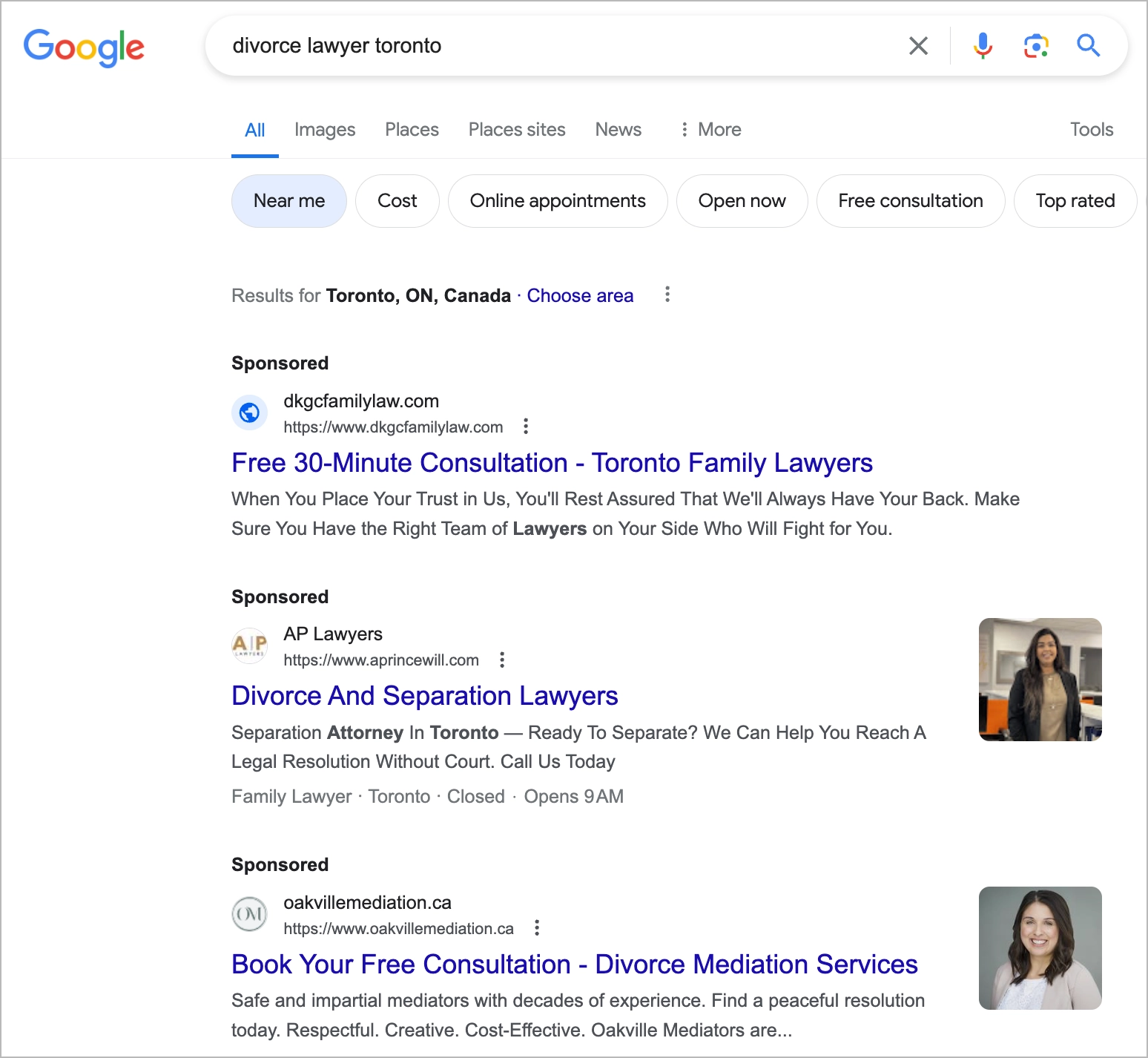
Here’s an example of the landing page that appears when a user clicks the second ad from the list above:
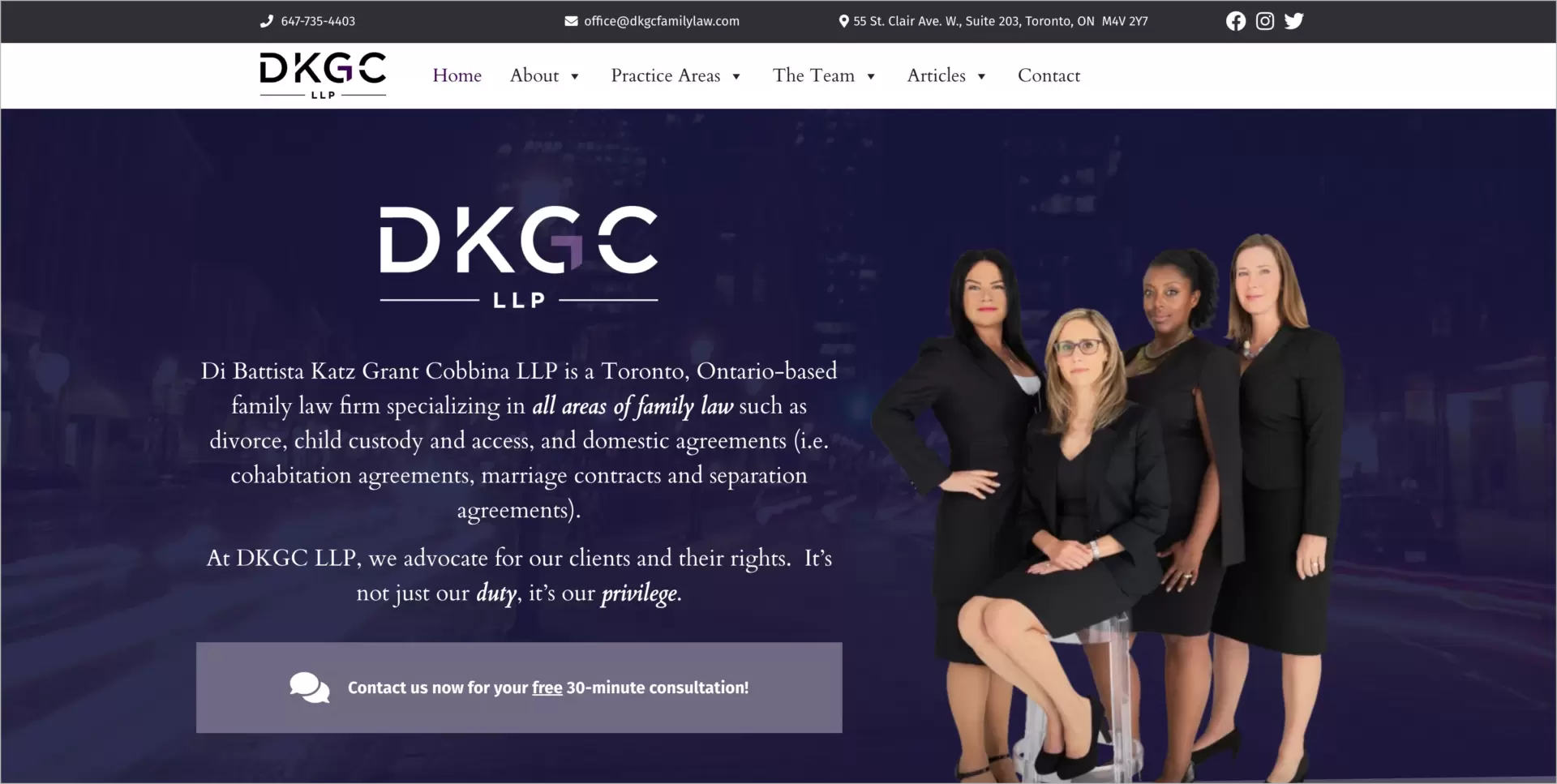
After landing on this page, the user can immediately contact the company and schedule a free 30-minute consultation.
2. Debt Law Services Example: Bez Długu
Below, you can see the display PPC ad example. It is presented to users browsing their social media feeds on Facebook, Linkedin, TikTok, etc.
One great benefit of these ads is that they appear when the user is performing tasks that are not related to buying intentions (such as internet browsing). This enhances the probability that the user will remember the company name and potentially reach out to it when they are ready to buy.
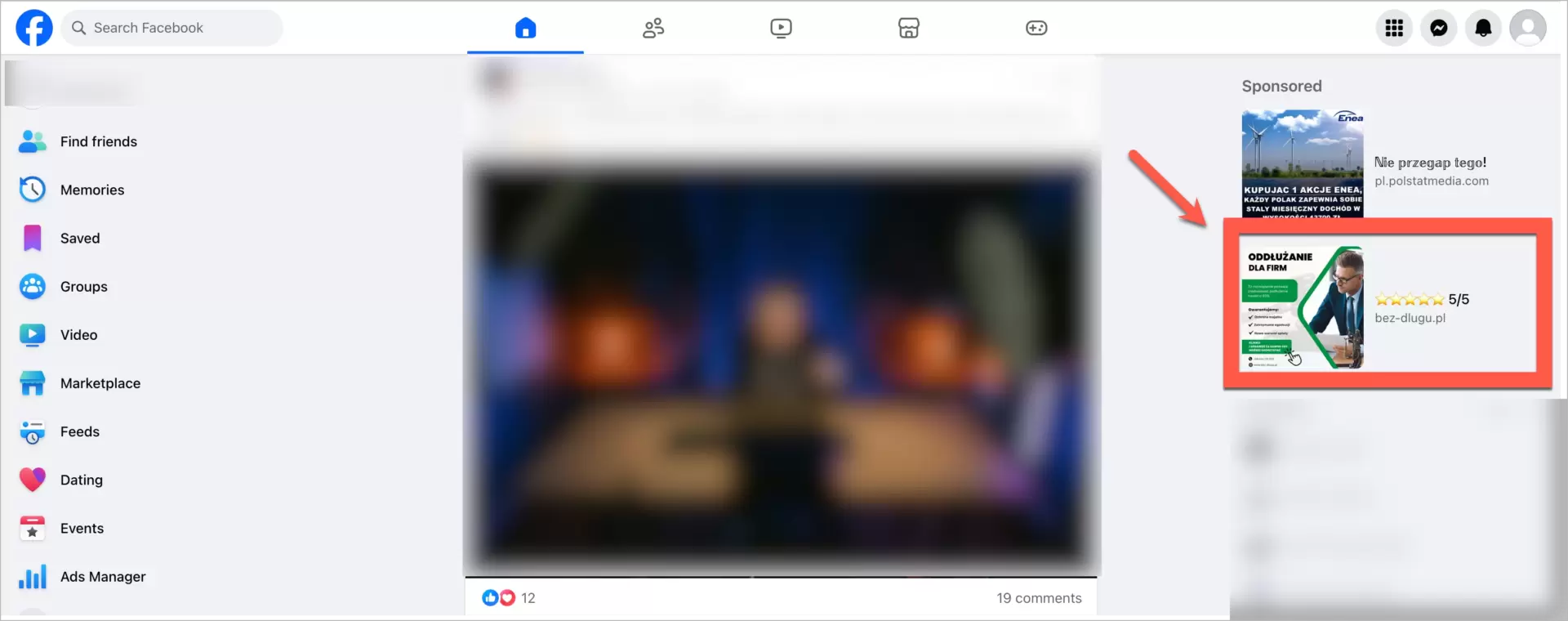
Of course, the user can also click on the advertisement, which will take them to the company’s landing page where they can request contact from the company or directly order its services.
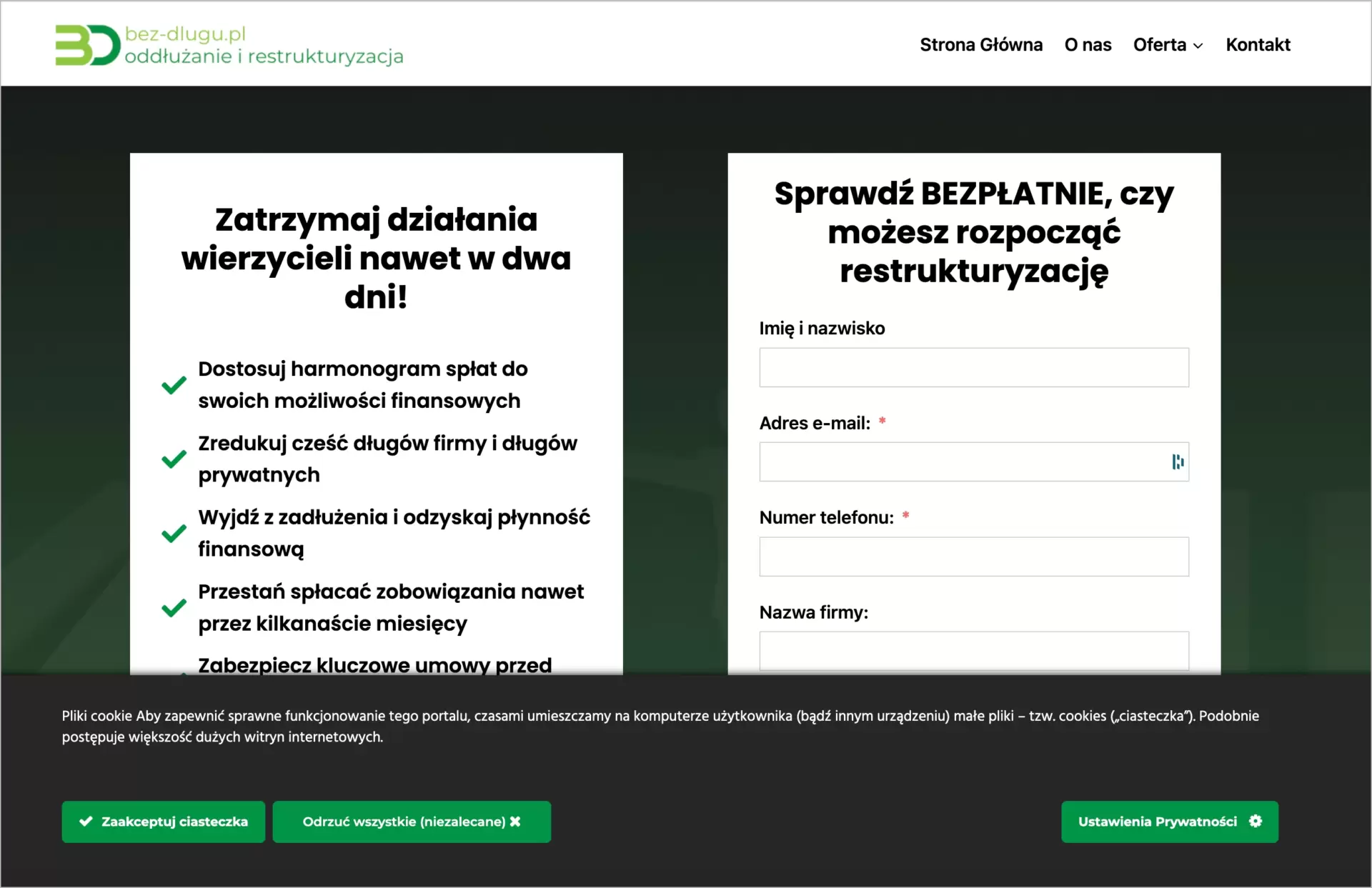
Display ads are often used in remarketing campaigns. They are only shown to users who have previously visited the specific site and are thus potentially interested in the type of services offered. This also enhances their effectiveness.
3. Legal Advice Services Example: JustAnswer
Another example of PPC for lawyers concerns YouTube. This ad destination can be quite effective as it’s related to what users type in a search box. By targeting specific keywords related to legal services, lawyers can display their ads directly to users searching for legal advice or representation. This method ensures that the advertisements are seen by individuals actively seeking legal help, increasing the likelihood of engagement.
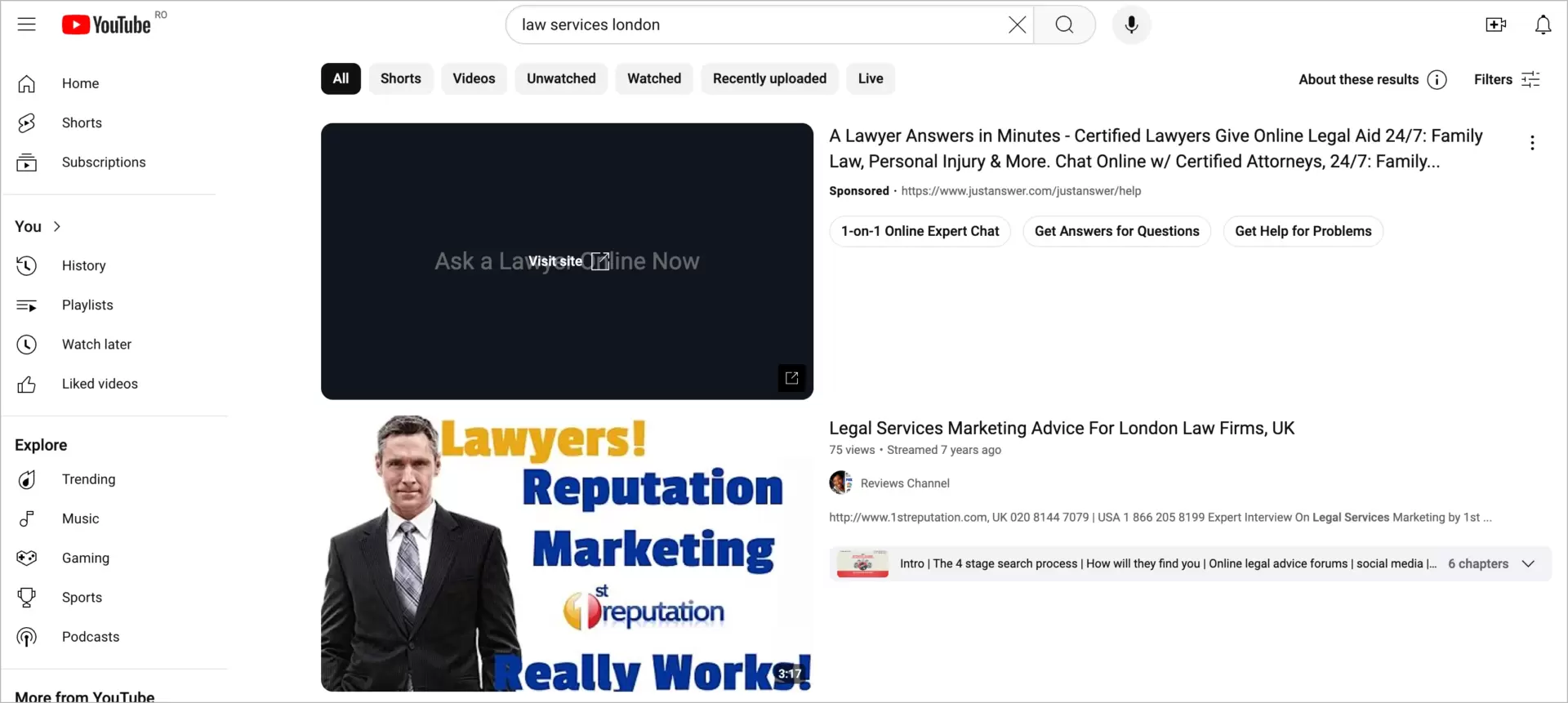
Once the user clicks the ad, instead of watching the video, he’s immediately moved to the company’s landing page, where he is presented with the chat contact form:
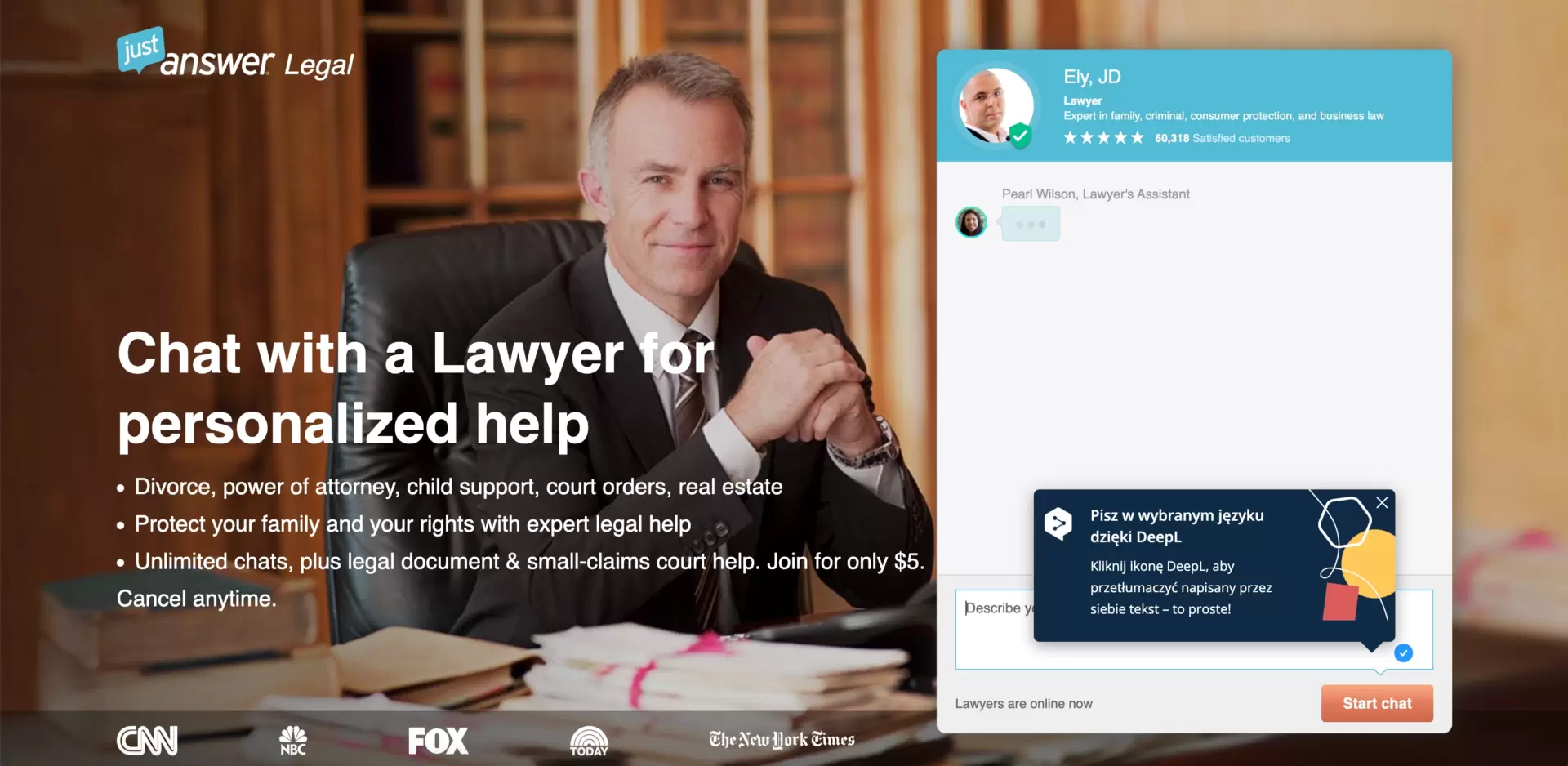
4. Attorney Services Example: Gal Pissetzky
Video PPC ads are rare in legal marketing, but they can be very powerful and shape the image of a particular lawyer or attorney with all the attributes that people seek: knowledge, strength, calm, and confidence. Check out the following video by Gal Pissetzky, which could be easily turned into a display ad, especially on YouTube on LinkedIn:
The video should be linked to a separate landing page, as this is the easiest way to share the necessary contact data with users. The link under the video is a must, but the better way is to include an interactive button directly in the video (if possible).
Are you looking for landing page kits dedicated to law services? Check out the Landingi template library with over 300 kits for specific industries and goals.
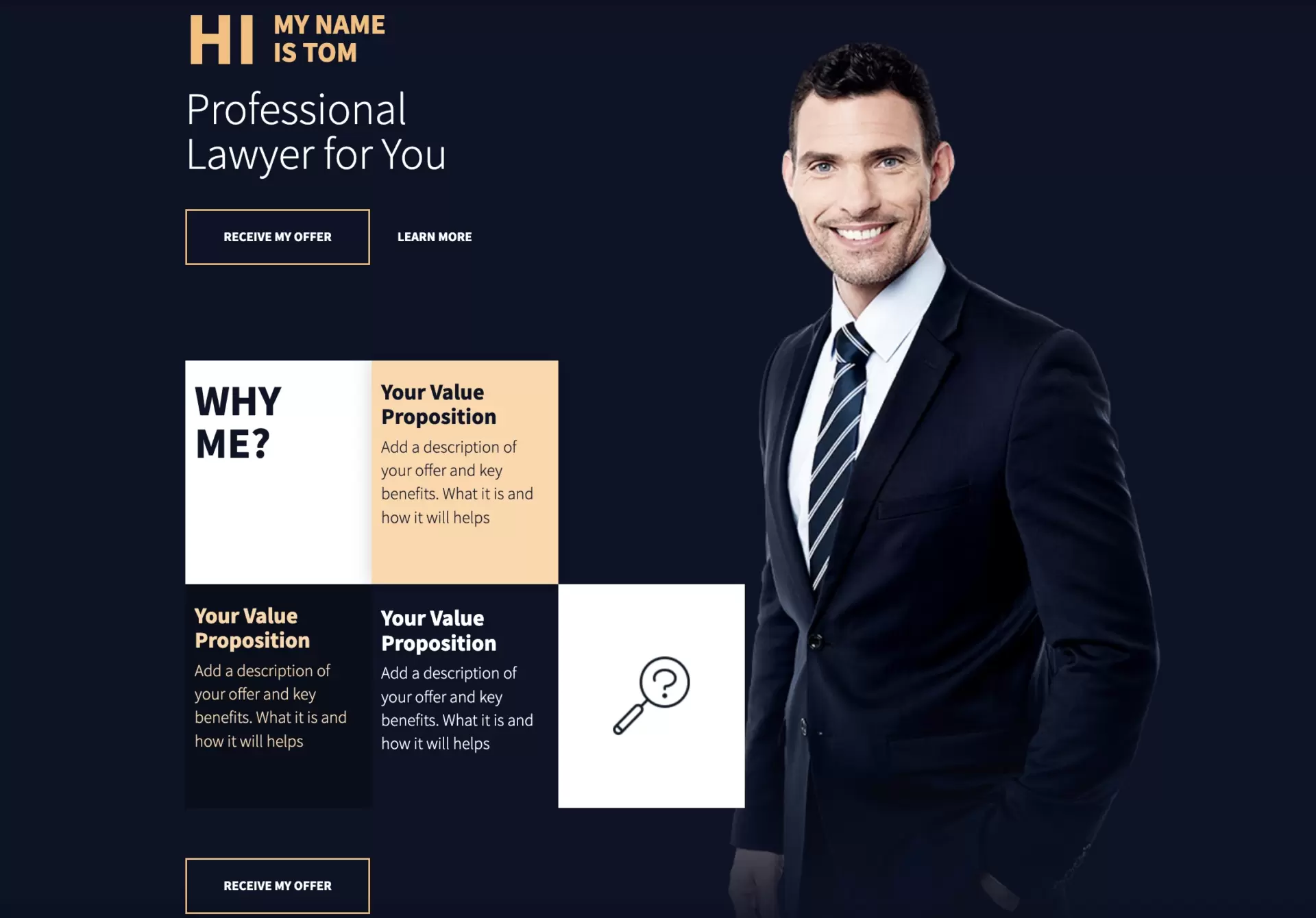
How to Measure the Success of Your Law PPC Campaigns?
You can measure the success of your law PPC campaigns with conversion metrics like CR, CTR, CPC, and others. Measuring the success of your law PPC campaigns is crucial to understanding their effectiveness and making informed decisions for optimization. Regularly reviewing and analyzing these metrics will help you make data-driven decisions to optimize your campaigns, maximize your return on investment, and attract more clients to your law firm.
How to Track ROI and Conversion Rates in Law PPC
You can track ROI and conversion rates in law PPC by applying conversion tracking and then monitoring various conversion metrics like CR, CPA, ROAS, QS, etc.
Conversion tracking is a way of constantly monitoring valuable business actions, such as form submissions, phone calls, or live chat interactions. Google Ads and other PPC platforms allow you to define what constitutes a conversion and track these events accurately.
Let’s take a glimpse at the most popular measures to track ROI and learn its essential features and advantages:
- Click-Through Rate (CTR): CTR is the ratio of clicks on your ad to the number of times it is shown (impressions). A higher CTR indicates that your ad is relevant and compelling to the audience. Monitor your CTR to gauge the effectiveness of your ad copy and keyword targeting.
- Conversion Rate: The conversion rate is the percentage of visitors who take a desired action after clicking on your ad. This metric helps you understand how well your landing page and overall campaign are performing in turning visitors into leads or clients.
- Cost Per Conversion (CPC): Also known as cost per acquisition (CPA), this metric measures how much you are spending to acquire a single conversion. Keeping track of your CPC helps you evaluate the cost-effectiveness of your campaigns and optimize your budget allocation.
- Quality Score: Quality Score is a metric used by Google Ads to measure the relevance and quality of your keywords, ads, and landing pages. A higher Quality Score can lead to lower costs and better ad positions. Monitor and improve your Quality Score to enhance the performance of your campaigns.
- Return on Ad Spend (ROAS): ROAS measures the revenue generated for every dollar spent on advertising. It is calculated by dividing the total revenue by the total ad spend. A higher ROAS indicates a more profitable campaign. Use this metric to assess the overall profitability of your PPC efforts.
- Impression Share: Impression share is the percentage of total impressions your ads receive compared to the total available impressions. This metric helps you understand your visibility in the market and identify opportunities to increase your reach.
- Bounce Rate: Bounce rate measures the percentage of visitors who leave your landing page without taking any action. A high bounce rate can indicate that your landing page is not relevant or engaging to the visitors. Monitor this metric to identify issues with your landing page and make necessary improvements.
- Average Position: This metric shows the average position of your ads in search results. A higher average position means your ads are appearing more prominently. Track this metric to ensure your ads are getting the visibility they need to attract clicks.
- Customer Lifetime Value (CLV): CLV measures the total revenue a client is expected to generate during their relationship with your firm. By understanding the CLV, you can better assess the long-term value of your PPC campaigns and adjust your strategies accordingly.
By tracking these key metrics, you can gain a comprehensive understanding of your PPC campaign performance.
What Are the Latest Trends in PPC Law Marketing?
The latest trends in PPC law marketing are the use of artificial intelligence, the rise of video ads, mobile optimization, personalization and voice search optimization.
Artificial intelligence (AI) and machine learning are revolutionizing PPC campaigns by predicting which ads are most likely to convert, automating bid adjustments, and providing deeper insights into performance. These technologies help law firms optimize their ad spend and improve campaign efficiency.
Video ads are becoming increasingly popular as video content dominates online engagement. Law firms use video ads to explain complex legal services, showcase client testimonials, and build trust with potential clients. Platforms like YouTube offer extensive reach and targeting capabilities, making video ads an effective tool in PPC strategies.
Mobile optimization is crucial as more people use smartphones to search for legal services. Law firms must ensure their ads and landing pages are mobile-friendly, including fast-loading pages, easy-to-navigate layouts, and mobile-specific ad formats like call-only ads.
Personalization in PPC campaigns is key to driving engagement. Ads tailored to the needs and concerns of potential clients are more effective. This can be achieved through remarketing, where ads are based on previous interactions with the firm’s website, and dynamic keyword insertion to make ads more relevant to search queries.
Voice search optimization is gaining traction as more users rely on voice assistants like Siri and Alexa. Law firms are optimizing their PPC campaigns for voice search queries by using natural language keywords and focusing on local SEO to capture voice search traffic.
What Are Common Mistakes to Avoid in Law PPC?
Common mistakes to avoid in law PPC include neglecting keyword research, using irrelevant ad copy, ignoring negative keywords, failing to optimize landing pages, and not tracking conversions.
Neglecting Keyword Research
Failing to conduct thorough keyword research can lead to targeting the wrong audience. It’s essential to identify and use keywords that potential clients are searching for. Without proper keyword research, your ads may not reach the right people, resulting in wasted ad spend and lower conversion rates.
Using Irrelevant Ad Copy
Your ad copy should be clear, compelling, and directly related to the keywords you are targeting. Irrelevant or vague ad copy can confuse potential clients and reduce the effectiveness of your PPC campaigns. Make sure your ads clearly communicate the services you offer and include strong calls to action.
Ignoring Negative Keywords
Negative keywords prevent your ads from showing up for searches that are not related to your services. Regularly updating your negative keyword list helps improve ad relevance and reduce wasted spend by ensuring your ads only appear for relevant searches.
Failing to Optimize Landing Pages
Your landing pages should be tailored to match the ad copy and keywords, providing clear and concise information about your legal services. Ensure your landing pages are easy to navigate, mobile-friendly, and include a strong call to action to encourage visitors to contact you.
Not Tracking Conversions
Conversion tracking allows you to measure the success of your PPC campaigns and make data-driven decisions. Without tracking, you won’t know which ads, keywords, or landing pages are driving conversions, making it difficult to optimize your campaigns effectively. Set up conversion tracking to monitor important actions such as form submissions, phone calls, and booked consultations.
How to Choose the Right PPC Agency for Your Law Business?
You should choose the right PPC agency for your law business by evaluating their experience in the legal industry, approach to strategy and execution, transparency and communication, range of services offered, and pricing structure.
- Experience and Expertise: Look for an agency with a proven track record in the legal industry. They should understand legal marketing, relevant keywords, and client behavior patterns.
- Strategy and Execution: Ensure the agency offers a comprehensive strategy, including thorough keyword research, compelling ad copy, and continuous optimization. They should be proactive in adjusting campaigns based on performance data.
- Transparency and Communication: The agency should provide regular, detailed reports and be open about their methods. They should explain how they plan to achieve your goals and what metrics they will use to measure success.
- Range of Services: Consider agencies that offer additional services like SEO, content marketing, and web design. This can help create a cohesive marketing strategy.
- Pricing Structure: Make sure the agency’s fees fit within your budget. Clarify what is included in their fees and if there are any additional costs for services like landing page creation or advanced analytics.
How to Collect Leads from PPC Law Campaigns?
You can collect leads from PPC law campaigns by optimizing your ads, landing pages (in Landingi or another professional creator), and lead capture methods. Write compelling ad copy with a strong call to action and ensure your ads are relevant to the target audience. Design pages that match your ads, are mobile-friendly, and include easy-to-complete lead capture forms. Offering something valuable, like a free consultation, can also increase form submissions.
Additionally, implement call tracking to capture leads who prefer phone contact and use remarketing to re-engage visitors who did not convert initially. By focusing on these strategies, you can effectively collect leads and convert more visitors into potential clients.
Next Steps to Elevate Your Law PPC Efforts
If you feel ready to turn the theory learned into practice, remember to choose the right landing page builder. Landing pages are where the final conversion takes place or not. While choosing your tool, ensure that it easily integrates with popular ad systems, as it’s not obvious. Take into account only platforms with templates crafted for your business field (law), as it greatly accelerates the creation process. Other must-haves are as follows:
- plenty of personalization options to make your pages fit your brand and engage visitors with powerful designs,
- AI content generation tools to save your time and money on creating targeted content for specific audiences,
- analytics and conversion tools, as they are key for optimizing landing pages based on data (this way you’ll identify and address users’ pain points to increase conversions).
All of these features are included in Landingi, which is recognized by PPC experts as one of the most powerful platforms in the game. Try it for free right now and join brands like Sony, Opera, and Nationale Nederlanden that trust it to deliver outstanding results for all kinds of digital marketing campaigns.

